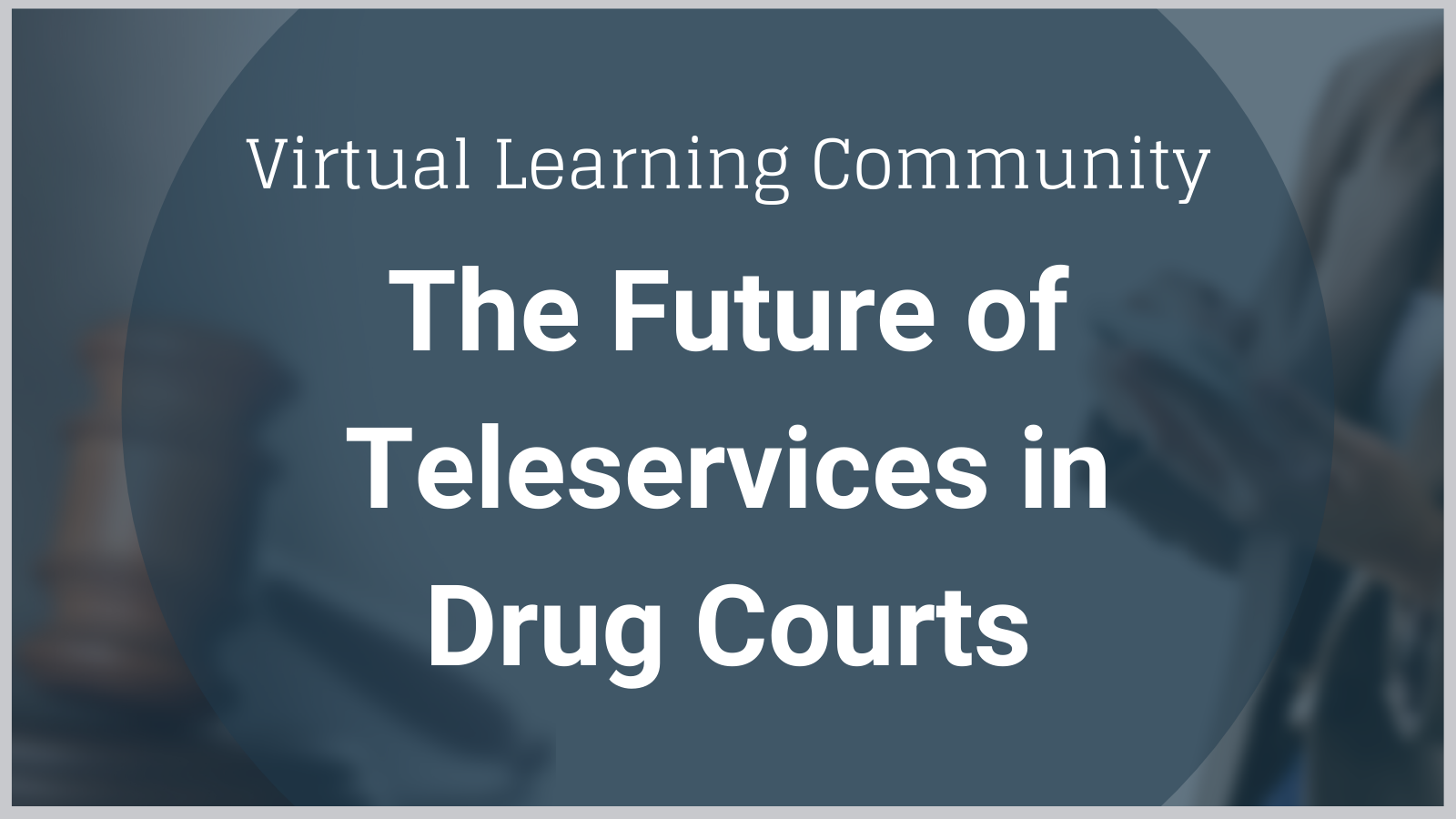Access the recordings of SAMHSA’s GAINS Center Future of Teleservices in Drug Courts Virtual Learning Community. Stay informed on future events by signing up for the GAINS Center mailing list.
Part I: Where Are We Now? Recent Developments and Emerging Opportunities
Click here for the Part I recording.
Treatment courts across the country have adapted almost overnight to COVID-19 guidance and restrictions, building quickly upon lessons learned from previous implementation efforts. Although the majority of this workforce continues to operate remotely today, treatment court practitioners are now beginning to contemplate strategic directions for a post-pandemic service model. Part I of this three-part Virtual Learning Community presents a retrospective view of the transition to teleservices from the perspective of treatment court practitioners, a review of the mounting evidence-base for teleservices in treatment court settings, commentary on the potential for enhancing best practice standards through the use of teleservices, and results of a nationwide survey of treatment courts regarding practice modifications, implementation barriers, effective innovations, and intent to continue use of teleservices.
Objectives
Following this event, participants will be able to do the following:
- Cite at least three distinct findings that demonstrate the effectiveness of teleservices
- Describe at least three distinct ways in which teleservices can enhance best practice standards
- Summarize nationwide survey results regarding provider intent to continue use of teleservices
Presenters
- Michael Chaple, PhD, Assistant Professor of Clinical Medical Psychology, Division on Substance Use Disorders, New York State Psychiatric Institute, Department of Psychiatry, Columbia University Medical Center, New York
- Tara L. Kunkel, MSW, Executive Director, Rulo Strategies LLC, Virginia
- Sheila E. McCarthy, LMSW, Senior Program Manager, Technical Assistance, Center for Court Innovation, New York
- Duane Slone, Circuit Court Judge, 4th Judicial District, Tennessee
- Victor Vasquez III, DWI Court Program Director, Webb County Court-at-Law II, Judicial Center of Excellence, Webb County, Texas
Part II: Planning for Teleservices—Assessing Needs and Identifying Opportunities
Click here for the Part II recording.
As treatment courts around the country begin to contemplate the landscape for a post-pandemic service environment, there is an increasing demand for guidance to determine the appropriateness of teleservices (i.e., for whom, when, and where?), best practices for implementation, and how to achieve the optimal balance of in-person and virtual services. Part II of this three-part Virtual Learning Community reviews the many considerations for treatment court practitioners to address as they plan for adoption or more permanent expansion of teleservices, including (a) assessment of organizational readiness and fit, (b) assessment of client readiness and fit, and (c) staff and client training needs. The goal of this webinar is to provide practitioners with a comprehensive strategy for building a strong foundation for teleservices.
Objectives
Following this event, participants will be able to do the following:
- Identify three domains of organizational readiness for teleservices and key considerations for each
- Identify three domains of client readiness for teleservices and key considerations for each
- Identify at least one priority for staff or client training to prepare for teleservices implementation
Presenters
- Michael Chaple, PhD, Assistant Professor of Clinical Medical Psychology, Division on Substance Use Disorders, New York State Psychiatric Institute, Department of Psychiatry, Columbia University Medical Center, New York
- Sheila E. McCarthy, LMSW, Senior Program Manager, Technical Assistance, Center for Court Innovation, New York
- Keris Jän Myrick, MBA, MS, Co-director, The Mental Health Strategic Impact Initiative (S2i), The Jed Foundation, New York
- Karen Otis, MA, LMHC, Associate Director, Treatment Court Programs, Center for Court Innovation, New York
- Victor Vasquez III, DWI Court Program Director, Webb County Court-at-Law II, Judicial Center of Excellence, Webb County, Texas
Part III: Implementing Teleservices for Court Proceedings and Treatment
Click here for the Part III recording.
After assessing readiness and fit and developing a comprehensive implementation plan for teleservices that takes into account site-specific opportunities, resources, and barriers, treatment courts may shift focus to delivery of the intervention(s). Part III of this three-part Virtual Learning Community provides detailed guidance on the many considerations for effective implementation of treatment court services delivered in virtual formats, including both court proceedings and treatment services. This event features a brief review of essential service elements, policies and procedures necessary to support effective delivery, strategies for ongoing quality assurance that will inform necessary refinements, and suggestions for tracking appropriate outcomes.
Objectives
Following this event, participants will be able to do the following:
- Identify at least three court proceedings that could be delivered virtually at their site
- Identify at least three strategies for enhancing access to treatment using virtual methods
- Communicate core elements of a framework for monitoring quality improvement
Presenters
- Michael Chaple, PhD, Assistant Professor of Clinical Medical Psychology, Division on Substance Use Disorders, New York State Psychiatric Institute, Department of Psychiatry, Columbia University Medical Center, New York
- Rebekah Provost-Emmons, MSW, Director of Criminal Justice Services, Department of Mental Health & Substance Abuse Services, Tennessee
- Susan Sturges, MA, MPA, New York State Opioid Court Project Director, Division of Policy and Planning, New York State Unified Court System, New York
- Victor Vasquez III, DWI Court Program Director, Webb County Court-at-Law II, Judicial Center of Excellence, Webb County, Texas
Join the GAINS Center mailing list to stay updated on future event announcements and registration.


